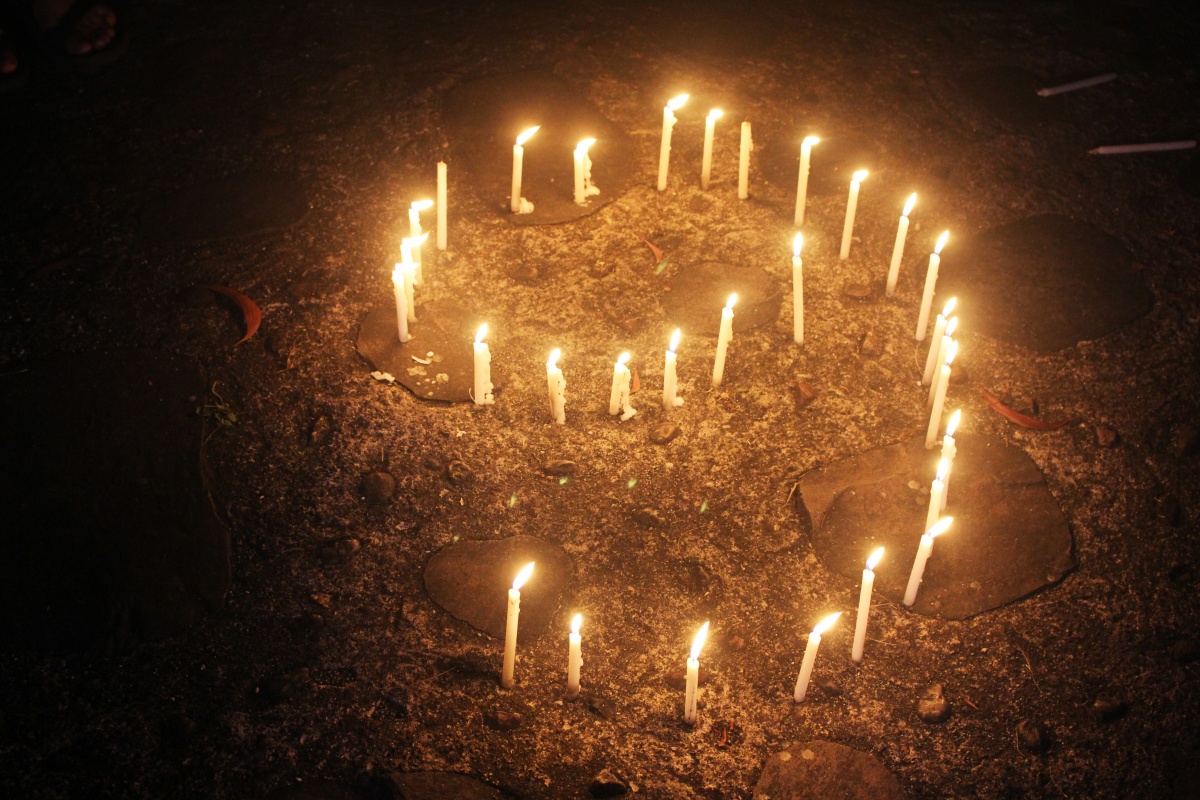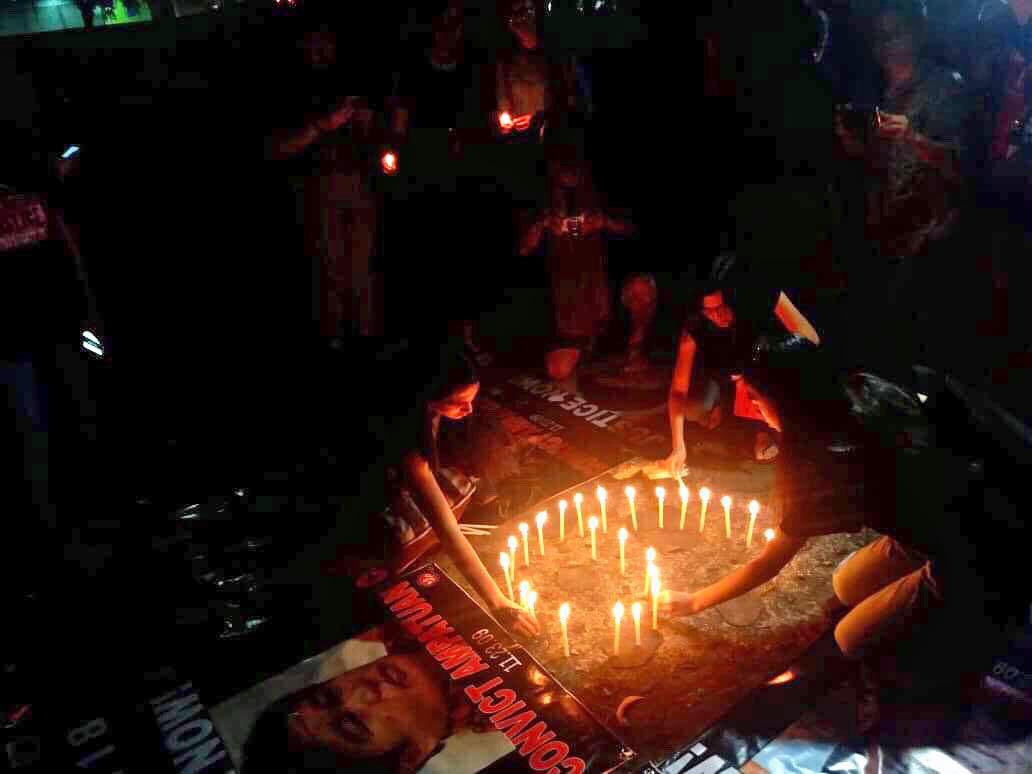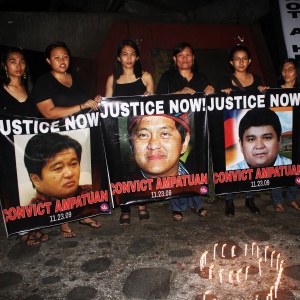Ampatuan Massacre: No Justice after Nine Years
“Ampatuan massacre ninth commemoration has become excruciating”
58 people, 32 of whom were journalists, were killed nine years ago and the Director of the National Union of Journalists – Philippines and IAWRT Philippines member Kath Cortez has lamented the lack of justice over the murders.
Cortez and members of IAWRT Philippines chapter based in Metro Manila joined NUJP’s annual commemoration of the 2015 massacre at the Bantayog ng mga Bayani in Quezon City. Journalists and media workers lit candles for the 58 killed and also to call for justice anew.
Those killed were on their way to a local Commission on Elections office to witness the filing of the certificate of candidacy for then-Buluan vice mayor Esmael Mangudadatu, running against then-incumbent mayor Andal Ampatuan Jr., in Maguindanao province, on the island of Mindanao when they were flagged down, kidnapped then killed by gunmen in Ampatuan town. Their bodies and cars were pused into a mass grave.
The dead included Mangudadatu’s wife, his two sisters, journalists, lawyers, aides, and motorists who were mistakenly identified as part of the convoy. Ther is evidence that the women were subjected to gender-based violence prior to and in the manner of their deaths.
The Committee to Protect Journalists tagged the Ampatuan massacre as the single deadliest event for journalists ever recorded.
Case of the century
 “We were told the decision will come out in a month, next month, in another month. We waited and waited, but there’s still no decision. What we want now is not just for a decision to come out now, but for the Ampatuans [family members and supporters] charged to be convicted—this is the call of the victims’ kin,” said NUJP Secretary-General Dabet Panelo.
“We were told the decision will come out in a month, next month, in another month. We waited and waited, but there’s still no decision. What we want now is not just for a decision to come out now, but for the Ampatuans [family members and supporters] charged to be convicted—this is the call of the victims’ kin,” said NUJP Secretary-General Dabet Panelo.
Panelo shared that the families of the victims said they do not want just a decision, but a conviction of the Ampatuans. The NUJP adopted the call of the families, “Justice Now” and “Convict Ampatuan.”
The Quezon City Regional Trial Court handling the case stated in a briefer that of the 197 accused, 117 were arrested and 80 remain at large. One hundred and four accused remain on trial. Five of the suspects died. Andal Ampatuan Sr., the clan patriarch and alleged mastermind of the massacre died in detention in 2015.
Last November 5, Ampatuan Jr. submitted his formal offer of evidence to wrap up the trial that started in January 2010. The prosecution panel has announced that the case against him is already submitted for decision.
Department of Justice Secretary Menardo Guevarra said that the decision is expected early next year. The promulgation date has not yet been set.
Challenge for Filipino journalists
 Cortez recalled that she was a communication arts student at Notre Dame of Marbel University when the massacre happened.
Cortez recalled that she was a communication arts student at Notre Dame of Marbel University when the massacre happened.
“Among those who died was a distant relative of mine. We secured the remains all the way from Ampatuan. The bodies recovered were covered with ice. Stench of formalin and Lysol (a disinfectant) filled the air. They were covered with ice and wrapped so that their families, friends and colleagues can hold their funeral and grieve,” recollected Cortez.
Cortez also shared she was among those who volunteered to dig up the bodies of unknown number of victims from the mass graves.
“That experience was enraging. It was the challenge we took up why most of us journalism students who volunteered to dig up the bodies continued and became part of the profession,” shared Cortez.
But even as she hoped the culture of impunity during that time would abate with the arrests of the primary suspects, patriarch and key members of the Ampatuan clan and also then incumbent government officials, she says impunity and lack of accountability of powerful and rich Mindanao families endure up to this day.
“The demand of Mindanao journalists now is an end to impunity, and also end to the implementation of martial law that only furthers this culture of impunity. We journalists from the alternative media in Mindanao witnessed how thousands of civilians, especially indigenous peoples, are forcibly evacuated from their communities every month due to harassment and militarization. The Marawi refugees’ situation is another example of forcible evacuation that martial law has caused,” said Cortez.
Martial Law in the whole of Mindanao island was declared in May 2017, following the siege of Marawi by the Maute clan and ISIS-inspired groups. Residents of Marawi were made to leave their homes and are still unable to return, to this day. Marawi City, a historic Islamic city, has been flattened and many families complained of looting of their homes by both the sides – the Maute and the military. Even as the government declared Marawi liberated late in 2017, President Rodrigo Duterte pushed for a one-year extension of Martial Law. As the end of the year deadline approaches, various government officials have called for another one-year extension.
IAWRT International Treasurer and Philippines chapter president Jola Diones-Mamangun condemned the snail-paced justice system in the country, even in a case as high profile as the Ampatuan massacre.
“We had 32 colleagues who did not know that they were going to their last coverage, their last task in the profession. While we seek justice for our slain colleagues in Ampatuan, harassments and killings of journalists continue to this day,” said Diones-Mamangun.
The Freedom for Media, Freedom for All network revealed that 12 journalists have been killed under the Duterte administration. The network documented 99 cases of direct and indirect assaults against journalists and media outfits. These include online harassment, libel, slay attempt, verbal threats/assaults, website attack, cyberlibel, arrest, barred from coverage, among others. Nearly half or 44 of the cases involved state agents of public officials, the network said.
“And while it is upsetting that martial law continues in Mindanao, impunity continues its reign, it cannot be said that there is no martial law here in Manila. This situation is detrimental to our work and to the basic freedoms of the people. This is why we call on our colleagues to join us in the call for justice, call for end to martial law, call for an end to impunity,” said Diones-Mamangun.








